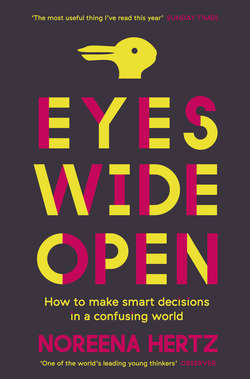Читать книгу Eyes Wide Open: How to Make Smart Decisions in a Confusing World - Noreena Hertz - Страница 31
… and Verbal Snowballs
ОглавлениеHaving had a few examples to contemplate, you may be feeling more on your guard now against a highly embellished avalanche of words. But be aware that it doesn’t necessarily take an avalanche to sway us. A verbal snowball can be just as powerful.
In a study, people asked to give a quality score to two dishes, one labelled ‘Succulent Italian Seafood Filet’, the other plain old ‘Seafood Filet’, rated the ‘Succulent’ dish higher, even when, as was the case here, they were both the same dishes. Similarly, ‘Tender Grilled Chicken’ was evaluated as tastier and more filling than the same dish when it was simply called ‘Grilled Chicken’.3 It’s amazing how a small number of simple but carefully chosen words can transform what your tastebuds actually seem to experience. It’s worth remembering this next time you’re standing in the queue at a fast-food restaurant.
You might also want to take heed of the findings of a recent study that looked at the way the wording of a CV affects how a job application is perceived. It turns out that an applicant whose CV is presented in the third person, with bullet points like ‘Communicated with clients globally’ or ‘Managed a large department’, tends to be considered more reliable, less boastful, more suitable for teamwork and a stronger candidate overall than an applicant whose CV is formulated in the first person, with bullet points such as ‘I communicated with clients globally’ or ‘I managed a large department.’ Even though the content in both cases is the same.4
Or look at what happened when, in a recent experiment at Stanford University, two groups were each asked to come up with recommendations for how to combat crime in Addison, a fictitious crime-ridden city in the United States.
Both groups were given exactly the same text:
Five years ago Addison was in good shape with no obvious vulnerabilities. Unfortunately, in the past five years the city’s defence systems have weakened, and the city has succumbed to crime. Today there are more than 55,000 criminal incidents a year – up by more than 10,000 per year. There is a worry that if the city does not regain its strength soon, even more serious problems may start to develop.
However, the two groups were given a slightly different opening sentence to the report. The first began, ‘Crime is a beast ravaging the city of Addison.’ The second, ‘Crime is a virus ravaging the city of Addison.’
One word different in a passage of seventy-nine words. Yet it turned out to have a huge impact.
Participants who had been told that crime was a ‘beast’ were significantly more likely to propose ‘catch and cage’ strategies – the hiring of additional police officers, the building of more jails; whereas the group who were given the word ‘virus’ leaned disproportionately towards ‘heal and cure’ methods of deterrence, such as crime-prevention strategies, and educational and social reforms.
This was regardless of whether they were Democrat or Republican, conservative or liberal-minded, young or old, male or female.
Moreover, the vast majority of the subjects were totally unaware that it was the metaphorical frames of ‘virus’ and ‘beast’ that had driven their decisions. When asked to identify which parts of the report had been most influential in their decision-making process, only 3 per cent of them correctly identified the metaphor as the driver.5
It really is incredible how vulnerable we are to subtleties of language when forming our opinions and making decisions. How unaware we can be of its pervasive powers. But we are. Time and again.
A whole host of other seemingly minor semantic tweaks have been shown to have significant impacts on our decision-making too.
